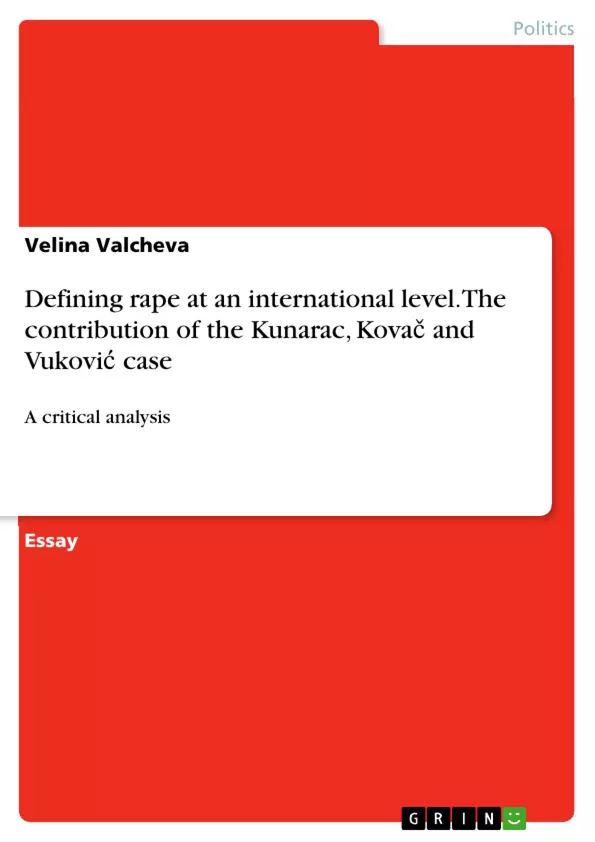The essay deals with the definition of rape at international level as adopted by the International Criminal Tribunal for the former Yugoslavia in the Kunarac, Kovač and Vuković case. The ICTY judgment in the so-called "rape camps" case has been subject to constant discussions, applauded by some and criticized by others, both from a legal and purely human perspective.
The reason why the case in hand attracts so much attention lies not only in the fact that it touches such a delicate topic as mass rapes in wartime. What makes it truly noteworthy, though, is the pioneering character it has as to the manner of dealing with that matter. The present paper strives to outline namely those features of the trial chamber’s decision, based on which it has been defined by many as a landmark one.
Inhaltsverzeichnis (Table of Contents)
- Introduction
- Purpose, methodology and structure
- Rape throughout the years – historical background
- Prosecutor v. Dragoljub Kunarac, Radomir Kovač and Zoran Vuković
- Facts of the case
- Muslim perception of rape
- Convictions and sentences
- Definition of rape
- Actus reus
- Mens rea
- Criticism towards the non-consent approach: the issue of the defence of "mistaken belief in consent"
- Conclusion
Zielsetzung und Themenschwerpunkte (Objectives and Key Themes)
This paper aims to analyze the contribution of the Kunarac, Kovač and Vuković case to the international legal definition of rape. It delves into the historical context of rape as a crime, examining the evolution of its perception from a consequence of war to a method of warfare. The paper also highlights the case's significance in establishing rape as a crime against humanity, a war crime, and an instrument of terror.
- The Kunarac, Kovač and Vuković case as a landmark decision in international law.
- The historical evolution of the perception of rape from a consequence of war to a method of warfare.
- The definition of rape as a crime against humanity, a war crime, and an instrument of terror.
- The role of international tribunals in prosecuting rape as an international crime.
- The critical analysis of the non-consent approach to defining rape and the defense of "mistaken belief in consent."
Zusammenfassung der Kapitel (Chapter Summaries)
The introduction lays out the paper's objective to examine the Kunarac, Kovač and Vuković case's influence on the international legal definition of rape. It provides a brief historical overview of rape as a crime, emphasizing its transformation from a consequence to a tool of warfare. This chapter also sets the stage for the analysis by highlighting the case's groundbreaking character in addressing rape as a crime against humanity and a war crime.
The second chapter delves into the Kunarac, Kovač and Vuković case, summarizing its key facts and the convictions handed down. This chapter further emphasizes the significance of the case in establishing systematic rape as a war crime and rape as an instrument of terror.
The third chapter provides a detailed examination of the definition of rape under international law, as adopted by the International Criminal Tribunal for the former Yugoslavia in the Kunarac, Kovač and Vuković case. It analyzes the elements of actus reus and mens rea, and discusses the legal and ethical complexities surrounding the "mistaken belief in consent" defense.
Schlüsselwörter (Keywords)
The main keywords of the paper are: rape, international law, war crime, crime against humanity, Kunarac, Kovač and Vuković case, International Criminal Tribunal for the former Yugoslavia, non-consent, "mistaken belief in consent," instrument of terror, historical background, prosecution, international tribunals.
Frequently Asked Questions
What is the significance of the Kunarac case in international law?
The Kunarac case is a landmark decision by the ICTY that established a clear international legal definition of rape and recognized it as a crime against humanity and a war crime.
How did the perception of rape in wartime change?
Historically viewed as a mere consequence of war, the ICTY judgments helped redefine rape as a deliberate method of warfare and an instrument of terror.
What are the elements of the legal definition of rape?
The paper analyzes the "actus reus" (the physical act) and the "mens rea" (the mental intent) required to prosecute rape at an international level.
What is the "non-consent" approach?
It is a legal framework where the focus is on the lack of consent of the victim. The paper also discusses the controversial defense of "mistaken belief in consent."
Why were the "rape camps" central to this case?
The case dealt with systematic rapes in detention centers during the conflict in the former Yugoslavia, highlighting the organized nature of these crimes.
- Citar trabajo
- Velina Valcheva (Autor), 2016, Defining rape at an international level. The contribution of the Kunarac, Kovač and Vuković case, Múnich, GRIN Verlag, https://www.grin.com/document/430899



